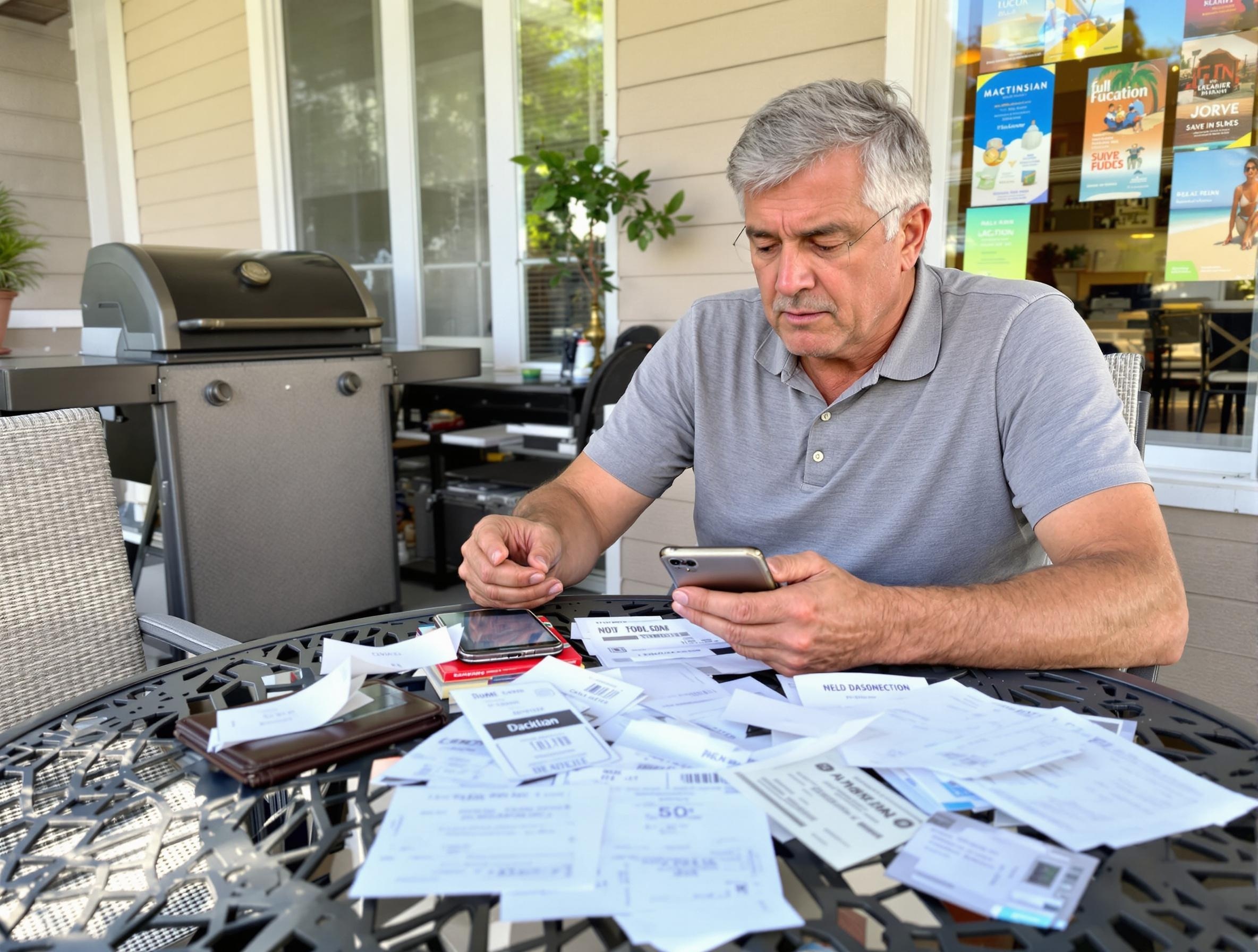Summer Spending Traps: Protecting Your Budget During Peak Season
You’ve worked hard all year to build financial stability. Then summer hits—and suddenly your budget has more holes than a fishing net.
“Beware of little expenses; a small leak will sink a great ship.”
— Benjamin Franklin
For men in their 40s and 50s juggling family obligations, social expectations, and the desire to actually enjoy life, summer becomes a financial minefield. It’s not just vacation costs. It’s the BBQ invitations, the ‘while we’re at it’ home projects, the kids’ activities, the higher utility bills, and the constant pressure to make memories that somehow require spending money.
Here’s the reality: summer spending traps aren’t about denying yourself fun—they’re about protecting your financial future while still enjoying the season. Let’s break down exactly how to do that.
Disclosure
This article contains affiliate links. If you choose to make a purchase through these links, we may earn a commission at no additional cost to you.
Common Summer Spending Traps Men Over 40 Face

Understanding where your money disappears during summer is the first step to protecting it. These traps are sneaky because they feel justified in the moment—but they add up fast.
1. The Entertainment Expense Explosion
Summer brings a social calendar packed with barbecues, concerts, sporting events, and family gatherings. What starts as “just a few extra activities” quickly becomes a budget-busting pattern of constant entertainment spending.
What is discretionary spending? This is money you spend on wants rather than needs—things like entertainment, dining out, or hobbies. Your mortgage payment is non-discretionary (you have to pay it), but that $50 concert ticket is discretionary (you choose to buy it). Summer is when discretionary spending spirals out of control.
Common triggers include:
- Concert and festival tickets that seem “once in a lifetime”
- Sporting events with premium seating and parking fees
- Restaurant meals that replace home cooking because “it’s too hot to cook”
- Impromptu weekend trips with friends
- Kids’ summer camps and activities that weren’t in the original budget
Real-world example: You budgeted $200 for summer entertainment, but by July you’ve already spent $500 because each week had “just one more” event. This is called budget creep—when your spending slowly increases without you noticing, like when “just one concert” turns into three concerts, two sporting events, and a music festival by the end of summer.
Remember, financial independence is one pillar of your overall well-being—and summer spending can undermine all three pillars if you’re not careful.
2. The Home Improvement Temptation
Warmer weather naturally leads to outdoor projects and home improvements. The “while we’re at it” mentality can transform a simple deck staining project into a complete backyard renovation.
Watch out for:
- Deck or patio upgrades that expand in scope
- New grills, outdoor furniture, and fire pits
- Landscaping projects that require expensive materials
- Pool maintenance and upgrades
- Power washing that reveals “necessary” repairs
Budget reality check: That new gas grill might seem essential, but a quality option like the Weber Spirit II E-310 runs $500-600. Add outdoor furniture, new cushions, and lighting, and you’re suddenly $2,000+ into a “simple upgrade.”
3. The Vacation Budget Creep
Even well-planned vacations can spiral out of control through peak season pricing, spontaneous activities, and the “we’re on vacation” spending mindset.
What is peak season pricing? This means businesses charge more when demand is highest—like hotels costing twice as much in July compared to October. That beach rental that costs $1,200/week in summer? It’s only $600/week in September for the exact same place.
Budget killers include:
- Flight prices 40-60% higher during peak travel weeks
- Hotel rates that double or triple compared to off-season
- Resort fees, parking charges, and hidden costs
- Daily restaurant meals instead of grocery shopping
- Souvenir spending and impulse purchases
- Activities and excursions not included in the original budget
Income-level perspective:
- If you’re working with limited resources: Whether you’re working with $50 or $500 for summer fun, these strategies scale to your situation. A budget-friendly summer doesn’t mean no fun—it means smart fun.
- If you have comfortable income: Even with a comfortable income, summer expenses can derail your retirement contributions or emergency fund growth. Protecting your budget now means freedom later.
- If you’re in a higher income bracket: Higher income doesn’t mean immunity to summer spending traps. Lifestyle inflation hits hardest during peak season when “we can afford it” becomes the default decision-making process.
Related Reading:
- The 50/30/20 Budget Reset: A Simple Framework for Financial Success
- Financial Foundation Reset: Your Mid-Life Money Checklist
- The Triangle of Well-being: How Health, Mind, and Money Connect
Smart Budget Adjustment Strategies

Step 1: Create Your Summer Spending Plan
Before summer arrives (or right now if you’re reading this mid-season), establish a realistic seasonal budget planning approach:
Calculate your summer spending capacity:
- Review last summer’s actual spending (check bank and credit card statements)
- Identify your non-negotiable summer expenses (camps, planned vacation, etc.)
- Add 20-30% to your normal monthly budget for increased costs
- Set a firm limit and track it religiously
Tracking made simple: Use a basic budgeting notebook like the Budget Planner by Clever Fox to manually track every expense, or go digital with apps like YNAB (You Need A Budget) or Mint for automated tracking.
Consider using budgeting tools like the Clever Fox Budget Planner to track your expenses more effectively. A physical planner can help you stay more engaged with your finances than digital apps alone.
Step 2: Implement the 50/30/20 Summer Rule
What is the 50/30/20 rule? This is a simple budgeting framework where 50% of your income goes to needs (housing, food, utilities), 30% to wants (entertainment, hobbies), and 20% to savings and debt payoff. For summer, you’re adjusting these percentages temporarily to accommodate seasonal expenses.
Adapt this classic budgeting rule for summer expense planning:
50% – Essentials (including increased utility costs)
- Mortgage/rent
- Groceries
- Insurance
- Car payments
- Utilities (expect 15-25% increase for AC)
30% – Wants (your summer fun budget)
- Entertainment and activities
- Dining out
- Vacation expenses
- Home improvement projects
- This is where you make strategic cuts if needed
20% – Savings and Debt (protect this at all costs)
- Emergency fund contributions
- Retirement savings
- Debt payments
- Future goals
The key insight: Small, consistent budget decisions create major financial breakthroughs. You don’t need perfect discipline—you need consistent awareness.
For detailed budgeting strategies, check out our guide on The 50/30/20 Budget Reset for Men Over 40.
Step 3: Use the Value-Based Decision Framework
What is value-based spending? This means asking “Will this actually make my life better?” before buying something, not just “Can I afford it?” A $300 family camping trip that creates lasting memories has more value than a $300 night out you’ll barely remember.
Before any summer purchase, ask yourself:
- Does this align with my priorities? (family time, health, experiences vs. stuff)
- Will I remember this in 6 months? (experiences often beat possessions)
- What am I sacrificing for this? (opportunity cost matters)
- Is there a budget-friendly alternative? (often yes)
- Am I buying this because of social pressure? (be honest)
Real-World Budget Scenarios: What This Looks Like
Let’s make this concrete with examples across different income levels:
Scenario 1: The $50,000 Income Family
- Monthly income: $4,167
- Summer entertainment budget: $250/month (6% of income)
- Strategy: Focus on free community events, one modest camping trip, home-based activities
- Gear investment: Basic camping equipment like the Coleman Sundome Tent ($70) provides years of budget-friendly vacations
- Result: Enjoy summer while maintaining $833/month savings goal
Scenario 2: The $100,000 Income Family
- Monthly income: $8,333
- Summer entertainment budget: $750/month (9% of income)
- Strategy: One week vacation (off-peak timing), selective paid events, quality over quantity
- Smart investment: A quality cooler like the YETI Tundra 45 ($300) enables budget-friendly picnics and day trips instead of expensive restaurants
- Result: Memorable summer while protecting $1,667/month retirement contributions
Scenario 3: The $150,000+ Income Family
- Monthly income: $12,500+
- Summer entertainment budget: $1,500/month (12% of income)
- Strategy: Premium experiences with intentionality, avoid lifestyle inflation traps
- Quality focus: Invest in experiences, not accumulating stuff—one amazing family adventure beats three mediocre ones
- Result: Exceptional summer without compromising $2,500+ monthly wealth-building
Note: These are examples. Your situation is unique—adjust percentages based on your debt, savings goals, and family size.
Budget-Friendly Summer Alternatives That Don’t Feel Like Sacrifice

The best summer memories rarely come from the most expensive activities. Here’s how to enjoy the season without draining your accounts.
Budget-Friendly Entertainment Options
Instead of expensive concerts or events, consider:
Free Community Activities:
- Outdoor concerts in parks (bring your own picnic)
- Community festivals and farmers markets
- Free museum days and cultural events
- Local hiking trails and nature preserves
- Public beach or lake access
Home-Based Entertainment:
- Backyard movie nights with a budget projector and screen setup ($80-120)
- Potluck BBQs where everyone contributes
- Game nights and card tournaments
- DIY water activities (sprinklers, water balloons)
Cross-pillar connection: Budget-friendly summer activities often overlap with your physical wellness goals. Free hiking, community sports leagues, and active family time cost nothing while improving your fitness—a perfect example of how your three pillars (physical wellness, mental resilience, and financial independence) work together. Learn more about this connection in our article on Health & Wealth: How Physical Wellness Impacts Your Financial Future.
Smart Vacation Strategies
Timing is Everything:
- Travel the week before or after peak season (save 30-50%)
- Book Tuesday-Thursday flights instead of weekends
- Consider “shoulder season” destinations (late May or early September)
- Use travel rewards credit cards strategically throughout the year
Accommodation hacks:
- Vacation rentals with kitchens (cook breakfast and some dinners)
- State park cabins instead of hotels
- House-swapping with friends or family
- Camping upgrades with quality gear that lasts years
Equipment and Gear:
Smart one-time investments that enable years of budget-friendly adventures:
- Coleman 6-Person Camping Bundle ($200) – Complete camping setup
- Igloo MaxCold Cooler ($50) – Budget alternative to premium coolers
- Anker Portable Charger ($40) – Keep devices charged on road trips
- LifeStraw Personal Water Filter ($20) – Save money on bottled water during outdoor activities
Learn more about creating sustainable financial habits in our Financial Foundation Reset guide.
Step-by-Step Summer Budget Protection Plan

Week 1: Assessment and Planning
Day 1-2: Review last year’s summer spending
- Pull bank and credit card statements from last June-August
- Calculate total summer overspending
- Identify your biggest spending categories
Day 3-4: Set your summer budget limits
- Use the 50/30/20 framework as your starting point
- Allocate specific amounts to categories (entertainment, vacation, home projects)
- Get family buy-in on the plan
Day 5-7: Create your tracking system
- Choose your method: app, spreadsheet, or budget planner notebook
- Set up categories matching your budget
- Establish weekly check-in schedule
Week 2: Implementation
Set up your systems:
- Move summer savings to a separate account
- Set up automatic transfers to savings (protect your 20%)
- Create calendar reminders for budget check-ins
- Share the plan with your partner/family
Establish boundaries:
- Decide on your “no-spend” days each week
- Set per-event spending limits
- Create a “fun fund” for spontaneous activities
- Agree on what requires discussion before purchasing
Week 3: Optimization
Review and adjust:
- Check spending after first two weeks
- Identify any budget leaks
- Adjust categories if needed (but don’t increase total budget)
- Celebrate wins and course-correct problems
Warning Signs Your Summer Budget Is Off Track:
If you checked 3+ boxes, it’s time to reset your summer spending immediately.
Week 4: Execution and Monitoring
Make it routine:
- Weekly 15-minute budget reviews
- Track every expense in real-time
- Use cash envelopes for discretionary categories
- Plan next week’s activities within budget
Stay accountable:
- Share progress with an accountability partner
- Join online communities focused on financial goals
- Reward yourself for staying on track (with free/cheap treats)
- Remember your “why”—what you’re protecting by staying disciplined
Protecting Your Long-Term Financial Goals

Remember that summer financial planning isn’t just about surviving the season—it’s about maintaining progress toward your bigger financial objectives. Every dollar overspent on summer activities is a dollar not working toward your retirement, emergency fund, or other important goals.
The key to success is maintaining clarity on your long-term financial priorities even when surrounded by short-term temptations.
Key principles to remember:
1. Your future self is counting on present-you
Every summer spending decision either moves you toward financial independence or away from it. There’s no neutral ground.
2. Memories don’t require maximum spending
The best family memories often come from simple, inexpensive activities. Don’t confuse spending money with creating value.
3. Discipline is easier than regret
Saying “no” to overspending today is uncomfortable for a moment. Dealing with debt and delayed retirement is uncomfortable for years.
4. Small wins compound
Every dollar you save by choosing the budget-friendly option grows through compound interest and builds your financial confidence.
5. This is practice for life
Learning to enjoy summer within your means teaches skills that serve you year-round and throughout your life.
Frequently Asked Questions About Summer Budget Protection
Take Action: Your 24-Hour Summer Budget Challenge
Quick Calculator: Your Summer Spending Limit
- Monthly take-home income: $_______
- Multiply by 0.30 (your wants budget): $_______
- Divide by 2 (summer entertainment share): $_______
- This is your monthly summer entertainment budget: $_______
Here’s what to do in the next 24 hours:
Hour 1: Calculate your summer spending limit using the formula above. Write it on a sticky note and put it on your bathroom mirror.
Hours 2-24: Track every dollar you spend today. Every. Single. Dollar. Coffee, lunch, that impulse Amazon purchase—write it down. Use your phone’s notes app, a small notebook, or a budgeting app.
Tomorrow: Review your spending. Ask yourself: “Did these purchases move me toward my financial goals or away from them?”
This simple 24-hour exercise reveals your spending patterns and creates immediate awareness—the first step to summer budget protection.
Want more financial strategies? Explore our complete Financial Independence resource library for men over 40.
Final Thoughts

Summer should enhance your life, not derail your financial future. By implementing these summer budget protection strategies and staying committed to value-based spending decisions, you can enjoy the season while maintaining the financial discipline that will serve you well beyond the summer months.
“The art is not in making money, but in keeping it.”
— Proverb
The difference between financial stress and financial freedom often comes down to these seasonal spending decisions. Choose wisely. Your future self will thank you.
Learn more about building financial independence
Planning Ahead: Bookmark this article and review it in March or April before summer spending season begins. Proactive planning prevents summer budget disasters.
Disclosure
This article contains affiliate links. If you choose to make a purchase through these links, we may earn a commission at no additional cost to you.
Important Note: The information provided in this article is for educational purposes only and should not be considered financial advice. Always consult with a qualified financial advisor before making significant financial decisions. Your situation is unique, and these general guidelines may need to be adjusted to your specific circumstances.











